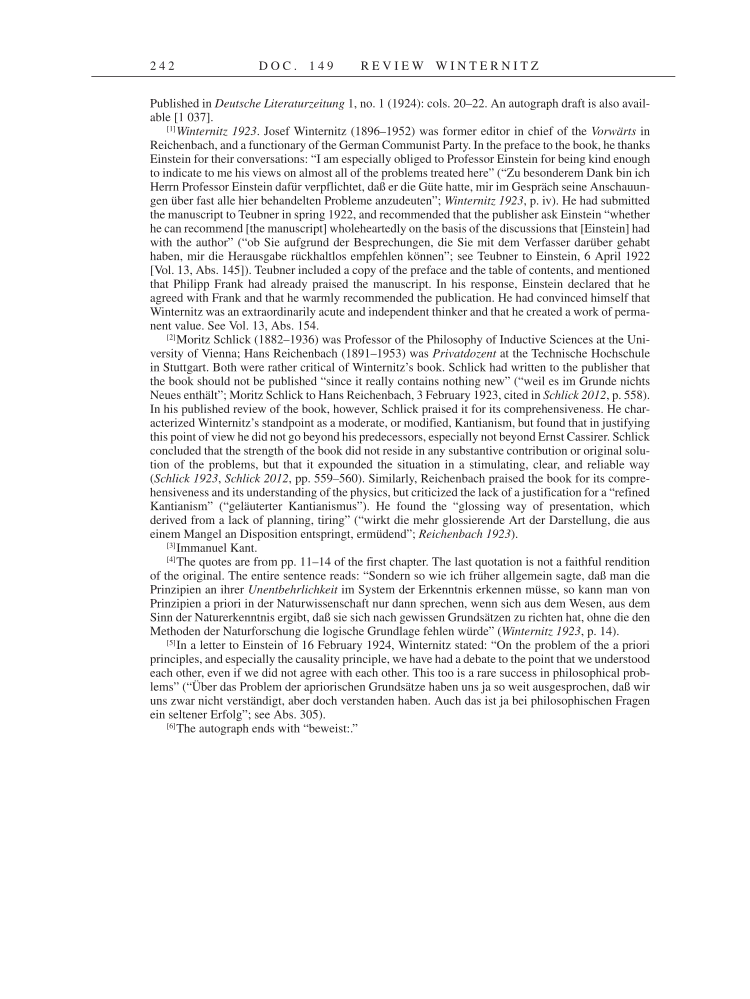2 4 2 D O C . 1 4 9 R E V I E W W I N T E R N I T Z Published in Deutsche Literaturzeitung 1, no. 1 (1924): cols. 20–22. An autograph draft is also avail- able [1 037]. [1]Winternitz 1923. Josef Winternitz (1896–1952) was former editor in chief of the Vorwärts in Reichenbach, and a functionary of the German Communist Party. In the preface to the book, he thanks Einstein for their conversations: “I am especially obliged to Professor Einstein for being kind enough to indicate to me his views on almost all of the problems treated here” (“Zu besonderem Dank bin ich Herrn Professor Einstein dafür verpflichtet, daß er die Güte hatte, mir im Gespräch seine Anschauun- gen über fast alle hier behandelten Probleme anzudeuten” Winternitz 1923, p. iv). He had submitted the manuscript to Teubner in spring 1922, and recommended that the publisher ask Einstein “whether he can recommend [the manuscript] wholeheartedly on the basis of the discussions that [Einstein] had with the author” (“ob Sie aufgrund der Besprechungen, die Sie mit dem Verfasser darüber gehabt haben, mir die Herausgabe rückhaltlos empfehlen können” see Teubner to Einstein, 6 April 1922 [Vol. 13, Abs. 145]). Teubner included a copy of the preface and the table of contents, and mentioned that Philipp Frank had already praised the manuscript. In his response, Einstein declared that he agreed with Frank and that he warmly recommended the publication. He had convinced himself that Winternitz was an extraordinarily acute and independent thinker and that he created a work of perma- nent value. See Vol. 13, Abs. 154. [2]Moritz Schlick (1882–1936) was Professor of the Philosophy of Inductive Sciences at the Uni- versity of Vienna Hans Reichenbach (1891–1953) was Privatdozent at the Technische Hochschule in Stuttgart. Both were rather critical of Winternitz’s book. Schlick had written to the publisher that the book should not be published “since it really contains nothing new” (“weil es im Grunde nichts Neues enthält” Moritz Schlick to Hans Reichenbach, 3 February 1923, cited in Schlick 2012, p. 558). In his published review of the book, however, Schlick praised it for its comprehensiveness. He char- acterized Winternitz’s standpoint as a moderate, or modified, Kantianism, but found that in justifying this point of view he did not go beyond his predecessors, especially not beyond Ernst Cassirer. Schlick concluded that the strength of the book did not reside in any substantive contribution or original solu- tion of the problems, but that it expounded the situation in a stimulating, clear, and reliable way (Schlick 1923, Schlick 2012, pp. 559–560). Similarly, Reichenbach praised the book for its compre- hensiveness and its understanding of the physics, but criticized the lack of a justification for a “refined Kantianism” (“geläuterter Kantianismus”). He found the “glossing way of presentation, which derived from a lack of planning, tiring” (“wirkt die mehr glossierende Art der Darstellung, die aus einem Mangel an Disposition entspringt, ermüdend” Reichenbach 1923). [3]Immanuel Kant. [4]The quotes are from pp. 11–14 of the first chapter. The last quotation is not a faithful rendition of the original. The entire sentence reads: “Sondern so wie ich früher allgemein sagte, daß man die Prinzipien an ihrer Unentbehrlichkeit im System der Erkenntnis erkennen müsse, so kann man von Prinzipien a priori in der Naturwissenschaft nur dann sprechen, wenn sich aus dem Wesen, aus dem Sinn der Naturerkenntnis ergibt, daß sie sich nach gewissen Grundsätzen zu richten hat, ohne die den Methoden der Naturforschung die logische Grundlage fehlen würde” (Winternitz 1923, p. 14). [5]In a letter to Einstein of 16 February 1924, Winternitz stated: “On the problem of the a priori principles, and especially the causality principle, we have had a debate to the point that we understood each other, even if we did not agree with each other. This too is a rare success in philosophical prob- lems” (“Über das Problem der apriorischen Grundsätze haben uns ja so weit ausgesprochen, daß wir uns zwar nicht verständigt, aber doch verstanden haben. Auch das ist ja bei philosophischen Fragen ein seltener Erfolg” see Abs. 305). [6]The autograph ends with “beweist:.”
